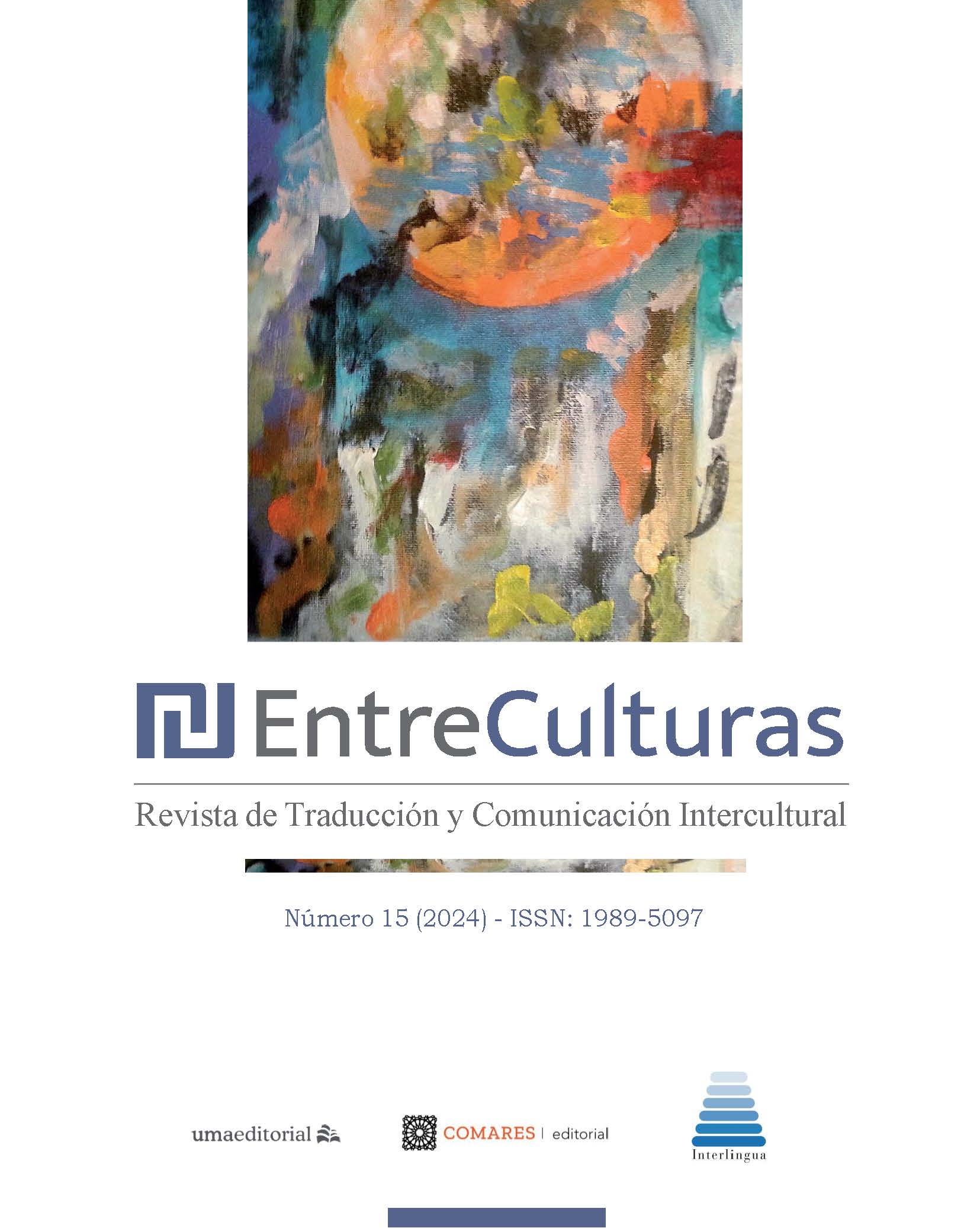Spanish
DOI:
https://doi.org/10.24310/ertci.15.2024.18633Keywords:
SpanishAbstract
The UN report of 2022 points to an unimaginable number of 103 million displaced persons who had to leave their country in search of asylum. In recent years, migrants have come mainly from the African and European parts of the continent. Based on these numbers, it is possible to speak of a serious humanitarian crisis. The European Union (mostly Germany and Spain) is an attractive destination for migration, especially for refugees from the war in Syria and Ukraine. The EU countries are characterised by their proximity and are known for their tourism, but they are also known for their good integration measures and social support for migrants (health insurance, financial help and educational and working opportunities). At the same time, linguistic mediation through translators and interpreters facilitates the reception of migrants and improves communication and coexistence. Social, medical and educational personnel, but also translators and interpreters, bear the greatest burden in the care of the migrant population in the host countries. This paper presents the experience of collaboration to face the current humanitarian crisis from the point of view of remote multilingual interpreters and proposes innovations in Translation and Interpreting Studies.
Downloads
Metrics
References
Badenes, Guillermo y Coisson, Josefina (2010). Ecotraducción. En Mirian Carballo y María Elena Aguirre (eds.), Eco-crítica, crítica verde. La naturaleza y el medio ambiente en el discurso cultural anglófono. Córdoba (Argentina).
Bertone, Laura (1989). En Torno a Babel. Estrategias de la Interpretación Simultánea. Hachette.
Binder, Leah (2013): Do as Dr. House Doesn’t. The Wall Street Journal. http://online.wsj.com/news/articles/SB100014241278873240
> [consulta: 16.II.2014].
Campos Andrés, Olga (2013). Procedimientos de desterminologizaciontraduccion y redaccion de guias para pacientes. Panace@: Revista de Medicina, Lenguaje y Traduccion, 14(37), 48–52.
Cedillo Corrochano, Carmen María (2021). El invisible papel de los traductores e intérpretes durante la COVID-19: estudio de las publicaciones de El País. Hikma 20(2), 301-330.
Corpas, Gloria y Gaber, Mahmoud (2020). Remote interpreting in public service settings: technology, perceptions and practice. SKASE. Journal of Translation and Interpreting, 13(2), 58.
Fill, Alwin (1993). Ökolinguistik. Eine Einführung. Gunter Narr.
Führer, Amand y Brzoska, Patrick (2020). Die Relevanz des Dolmetschens im Gesundheitssystems. The Importance of Language Interpretation in the Health Care System. Gesundheitswesen. 2020. Thieme. Universitäts- und Landesbibliothek.
Hale, Sandra Beatriz (2007). Community Interpreting. Palgrave Macmillan,
Hale, Sandra Beatriz (2010). La interpretación comunitaria, la interpretación en los sectores jurídico, sanitario y social. Comares.
Haugen, Einar (1972). The Ecology of Language. En Einar Haugen (ed.) The Ecology of Language. Language Science and National Development (pp. 325-339). Stanford.
Koreneva, Olga (2020). Embodied learning of the German language: teaching methodology for translators and interpreters. mAGAzin, 28, 59-67.
Koreneva Antonova, Olga (2023). Docencia de Interpretación en alemán-español: propuesta de la metodología interactiva y situada con elementos de gamificación. CLINA, Revista interdisciplinaria de traducción, interpretación y comunicación intercultural 9(2), 183–206. https://doi.org/10.14201/clina202392183206.
Koreneva-Antonova, Olga y Gallego Gallardo, Isabel (en prensa). Innovación para la enseñanza sostenible de lenguas extranjeras para Traducción, Interpretación y Turismo: Ecodidáctica con el ChatGPT. Peter Lang.
Lázaro Gutiérrez, Raquel, Alvaro Aranda, Cristina (2021). Public service interpreting and translation in Spain. En Marketa Štefková, Koen Kerremans y Benjamin Bossaert (eds.), Training public service interpreters and translators: a European perspective (pp.71-87). Univerzita Komenského v Bratislave.
Ramasco Gutiérrez, Milagros, Giménez Romero, Carlos y Marchioni, Marco (2020). Una década trabajando por la mejora de la convivencia: El Proyecto de Intervención Comunitaria Intercultural. Revista Madrileña de Salud Pública, 3(9), 1-7.
doi:https://doi.org/10.36300/remasp.2020.052
Surkamp, Carola (2022). Bildung für nachhaltige Entwicklung im Englischunterricht. Klett Kallmeyer.
Tejada Caller, Paloma (2016). Ecología y traducción: reconfiguración lingüística del protagonista narrativo en la obra de H. G. Wells The Country of the Blind. Alfinge, 28, 89-108.
Tercedor Sánchez, María Isabel, Clara Inés López Rodríguez y Juan Antonio Prieto-Velasco (2014). También los pacientes hacen terminología. Panace@: Revista de Medicina, Lenguaje y Traducción, 15(39), 95–102.
Waldhaus, Christoph (2021). Didaktische Überlegungen zu grenzüberschreitenden Prozessen im DaF-Unterricht. En Paolo Costa (ed.), New Challenges in Tertiary Forneign Language Teaching (pp. 69-103). Fu Jen Catholic University Press.
Otras fuentes bibliográficas
Der Spiegel online 1: https://www.spiegel.de/politik/deutschland/fluechtlinge-eu-registriert-2023-mehr-als-eine-million-asylantraege-a-8e7864df-686c-43c2-99d8-f33571286e2c
Der Spiegel online 2: Landeseinrichtung in Suhl verhängt Aufnahmestopp für Geflüchtete
Der Spiegel online 3: Ein Unternehmer sollte selbst entscheiden, wen er in seinem Betrieb beschäftigen kann. Disponible en. https://www.spiegel.de/wirtschaft/migration-und-arbeit-handwerkspraesident-joerg-dittrich-will-beschaeftigung-vereinfachen-a-a7e54d19-6914-4613-840a-cc2b5de42e53
Informe de la ONU: Uno-Flüchtlichgshilfe. https://www.uno-fluechtlingshilfe.de/informieren/fluechtlingszahlen
Magazin: https://www.migazin.de/2022/03/31/keine-sprachkurs-kapazitaeten-fuer-ukrainische-gefluechtete/
Ministerio Federal de Migración y Refugiados – BAMF https://www.bamf.de/DE/Themen/Forschung/Veroeffentlichungen/Migrationsbericht2019/MigrationsgeschehenEU/migrationsgescheheneu-node.html
Salud Mental: https://prevencionsuicidio.som360.org/es/blog/migracion-suicidio
Medienservice: https://www.medienservice.sachsen.de/medien/news/1070253
Tagesschau: https://www.tagesschau.de/ausland/corona-europarat-haeusliche-gewalt-pejcinovic-buric-101.html
Proasyl: https://www.proasyl.de/news/schicksal-abschiebung-zehn-schlaglichter-aus-2020/
http://fra.europa.eu/es/eu-charter/article/18-derecho-de-asilo
Downloads
Published
How to Cite
Issue
Section
License
Copyright (c) 2024 Olga Koreneva Antonova

This work is licensed under a Creative Commons Attribution-NonCommercial-ShareAlike 4.0 International License.
All contents published in Entre culturas. Revista de traducción y comunicación intercultural are protected under the Creative Commons Attribution-NonCommercial-ShareAlike 4.0 International (CC BY-NC-SA 4.0) license. All about this license is available in the following link: <http://creativecommons.org/licenses/by-nc-sa/4.0>
Users can copy, use, redistribute, share and exhibit publicly as long as:
- The original source and authorship of the material are cited (Journal, Publisher and URL of the work).
- It is not used for comercial purposes.
- The existence of the license and its especifications are mentioned.
There are two sets of authors’ rights: moral and property rights. Moral rights are perpetual prerogatives, unrenounceable, not-transferable, unalienable, imprescriptible and inembargable. According to authors’ rights legislation, Entreculturas. Revista de traducción y comunicación intercultural recognizes and respects authors moral rights, as well as the ownership of property rights, which will be transferred to University of Malaga in open access. The property rights are referred to the benefits that are gained by the use or the dissemination of works. Entreculturas. Revista de traducción y comunicación intercultural is published in an open access form and it is exclusively licenced by any means for doing or authorising distribution, dissemination, reproduction, , adaptation, translation or arrangement of works.
Authors are responsable for obtaining the necessary permission to use copyrighted images.





7.png)
